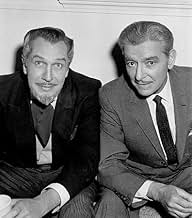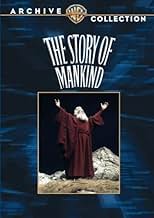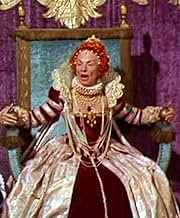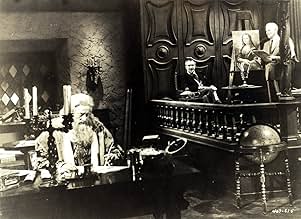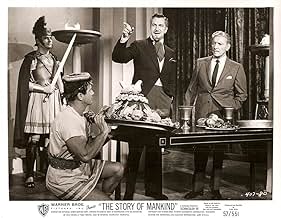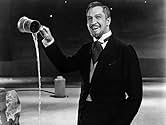ÉVALUATION IMDb
4,8/10
1,6 k
MA NOTE
Ajouter une intrigue dans votre langueThe Devil and the Spirit of Man argue as to whether or not humanity is ultimately good or evil.The Devil and the Spirit of Man argue as to whether or not humanity is ultimately good or evil.The Devil and the Spirit of Man argue as to whether or not humanity is ultimately good or evil.
- Director
- Writers
- Stars
Commentaire en vedette
The opening titles of this historical epic one of the most notoriously misjudged films in Hollywood history boast no fewer than 25 stars but, having personally gone through it, I have to say that its reputation is entirely justified! I'd always been interested in it, of course, yet I'd practically given up hope of ever catching the film
and, eventually, I only managed to come across a soft-looking, panned-and-scanned VHS copy with forced Spanish subtitles (which will more than suffice under the circumstances).
Actually, the central premise isn't half-bad a tribunal in outer space(!), presided over by Sir Cedric Hardwicke, convenes to determine whether mankind should be allowed to go on living or else let it obliterate itself via the misuse of nuclear weapons! In fact, the opening half-hour or so is fairly decent but, as soon as one realizes that the film will be a constant parade of Hollywood stars stolidly appearing (portraying is hardly the correct term to use here) as famous historical figures who are subsequently given little of consequence to do it becomes a depressing, repetitive and altogether rather dull charade!
At least, the main roles of The Spirit Of Man (a suave and gracefully aged Ronald Colman in his last film) and Mr. Scratch aka The Devil (a typically genial turn by Vincent Price) are ideally filled something which, alas, can't be said of most of their colleagues: Hardwicke himself merely gets in a few inane phrases between Colman and Price's rebuttals, but, for good measure, we also have to contend with John Carradine (as a campily-dressed Pharaoh), Peter Lorre (as a thoroughly miserable Nero, which is ironic given that the role had often inspired actors towards hamminess!), Virginia Mayo (unrecognizable as Cleopatra), Hedy Lamarr (an embarrassingly miscast Joan of Arc), Dennis Hopper (as a wimpy Napoleon Bonaparte!) and, surely the weirdest casting choice of all, the Marx Brothers (appearing in their final team effort, albeit separately: Chico barely registers as a monk in the Christopher Columbus episode, Groucho incongruously appearing fully in character, with glasses and wisecracks intact[!], as obscure American Pilgrim Peter Minuit, and Harpo, ditto, as a mute and harp-playing Sir Isaac Newton)!!
The various re-enactments (amidst which Colman and Price are free to roam) display a rampant use of stock footage thus making the film seem more expensive than it actually is and naturally end with the present i.e. 1957 crisis; in hindsight, the script's constant reference to the "Super H-bomb" is amusing and dates the show more than anything else! At a mere 100 minutes, such an ambitious enterprise was doomed from the start and, indeed, it feels too much like a crash-course in World History (intercut with elementary bits of Philosophy). Perhaps, the kindest thing that can be said about THE STORY OF MANKIND is that, for better or worse, it did pave the way for Irwin Allen's heyday as a producer of star-studded Hollywood blockbusters.
Actually, the central premise isn't half-bad a tribunal in outer space(!), presided over by Sir Cedric Hardwicke, convenes to determine whether mankind should be allowed to go on living or else let it obliterate itself via the misuse of nuclear weapons! In fact, the opening half-hour or so is fairly decent but, as soon as one realizes that the film will be a constant parade of Hollywood stars stolidly appearing (portraying is hardly the correct term to use here) as famous historical figures who are subsequently given little of consequence to do it becomes a depressing, repetitive and altogether rather dull charade!
At least, the main roles of The Spirit Of Man (a suave and gracefully aged Ronald Colman in his last film) and Mr. Scratch aka The Devil (a typically genial turn by Vincent Price) are ideally filled something which, alas, can't be said of most of their colleagues: Hardwicke himself merely gets in a few inane phrases between Colman and Price's rebuttals, but, for good measure, we also have to contend with John Carradine (as a campily-dressed Pharaoh), Peter Lorre (as a thoroughly miserable Nero, which is ironic given that the role had often inspired actors towards hamminess!), Virginia Mayo (unrecognizable as Cleopatra), Hedy Lamarr (an embarrassingly miscast Joan of Arc), Dennis Hopper (as a wimpy Napoleon Bonaparte!) and, surely the weirdest casting choice of all, the Marx Brothers (appearing in their final team effort, albeit separately: Chico barely registers as a monk in the Christopher Columbus episode, Groucho incongruously appearing fully in character, with glasses and wisecracks intact[!], as obscure American Pilgrim Peter Minuit, and Harpo, ditto, as a mute and harp-playing Sir Isaac Newton)!!
The various re-enactments (amidst which Colman and Price are free to roam) display a rampant use of stock footage thus making the film seem more expensive than it actually is and naturally end with the present i.e. 1957 crisis; in hindsight, the script's constant reference to the "Super H-bomb" is amusing and dates the show more than anything else! At a mere 100 minutes, such an ambitious enterprise was doomed from the start and, indeed, it feels too much like a crash-course in World History (intercut with elementary bits of Philosophy). Perhaps, the kindest thing that can be said about THE STORY OF MANKIND is that, for better or worse, it did pave the way for Irwin Allen's heyday as a producer of star-studded Hollywood blockbusters.
- Bunuel1976
- 16 déc. 2008
- Lien permanent
Histoire
Le saviez-vous
- AnecdotesIrwin Allen managed to assemble his all-star cast by promising them they would only be filming for one day and that they would get paid $25,000 for doing so.
- GaffesThe cheap production values of this film resulted in many anachronisms. Some of the most obvious include: In ancient Greece, the hand of Plato is shown writing in cursive with a stylus, but he has no inkwell, and his shirtsleeve (on a toga?) looks more medieval or renaissance. In the next shot, Aristotle is surrounded by bubbling glass beakers filled with colored liquids, a la Victor Frankenstein's laboratory. The Indian who sells Manhattan sits in front of a Plains tribe tepee and wears a full Western war bonnet.
- Citations
Mr. Scratch: Then, came the red man, fighting for his very survival and the white man determined to take away this so-called god-given heritage, used the foulest of methods. Rather confusing, don't you think?
- ConnexionsEdited from Robin des Bois (1938)
Meilleurs choix
Connectez-vous pour évaluer et surveiller les recommandations personnalisées
- How long is The Story of Mankind?Propulsé par Alexa
Détails
- Date de sortie
- Pays d’origine
- Langues
- Aussi connu sous le nom de
- La historia de la humanidad
- Lieux de tournage
- société de production
- Consultez plus de crédits d'entreprise sur IMDbPro
- Durée1 heure 40 minutes
- Rapport de forme
- 1.66 : 1
Contribuer à cette page
Suggérer une modification ou ajouter du contenu manquant

Lacune principale
By what name was The Story of Mankind (1957) officially released in India in English?
Répondre




















